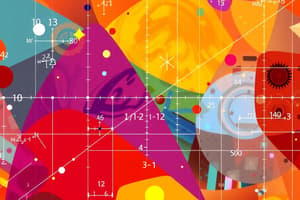Podcast
Questions and Answers
Was versteht man unter einem Eigenvektor?
Was versteht man unter einem Eigenvektor?
- Ein Nullvektor, der eine Matrix unverändert lässt.
- Ein Vektor, der sich um einen Skalarfaktor ändert, wenn eine lineare Transformation angewendet wird. (correct)
- Ein Vektor, der sich nicht ändert, wenn eine lineare Transformation angewendet wird.
- Ein Vektor, der orthogonal zu allen anderen Vektoren in einem Raum ist.
Welche Rolle spielen Eigenwerte und Eigenvektoren bei der Charakterisierung einer Matrix?
Welche Rolle spielen Eigenwerte und Eigenvektoren bei der Charakterisierung einer Matrix?
- Sie dienen zur Bestimmung der Determinante der Matrix.
- Sie ermöglichen die Bestimmung des charakteristischen Polynoms einer Matrix. (correct)
- Sie beeinflussen die Spur einer Matrix.
- Sie sind wichtig für die Berechnung des Rangs einer Matrix.
Was ist eine lineare Transformation?
Was ist eine lineare Transformation?
- Eine Funktion, die die Vektoraddition und Skalarmultiplikation erhält. (correct)
- Eine Funktion, die Vektoren in verschiedenen Dimensionen verändert.
- Eine Funktion, die die Vektoraddition und Skalarmultiplikation nicht erhält.
- Eine Funktion, die nur auf Nullvektoren angewendet werden kann.
Wie können Systeme linearer Gleichungen gelöst werden?
Wie können Systeme linearer Gleichungen gelöst werden?
Warum sind lineare Systeme in den Bereichen Ingenieurwesen, Physik und Wirtschaftswissenschaften wichtig?
Warum sind lineare Systeme in den Bereichen Ingenieurwesen, Physik und Wirtschaftswissenschaften wichtig?
Wie können lineare Transformationen genutzt werden?
Wie können lineare Transformationen genutzt werden?
Was ist ein Vektorraum?
Was ist ein Vektorraum?
Was sind Matrizen in Bezug auf lineare Algebra?
Was sind Matrizen in Bezug auf lineare Algebra?
Was sind Eigenwerte und Eigenvektoren in der linearen Algebra?
Was sind Eigenwerte und Eigenvektoren in der linearen Algebra?
Welche Rolle spielen Matrizen bei der Lösung von Systemen linearer Gleichungen?
Welche Rolle spielen Matrizen bei der Lösung von Systemen linearer Gleichungen?
Was charakterisiert eine lineare Transformation in der linearen Algebra?
Was charakterisiert eine lineare Transformation in der linearen Algebra?
Wie können Eigenwerte und Eigenvektoren verwendet werden, um lineare Transformationen zu analysieren?
Wie können Eigenwerte und Eigenvektoren verwendet werden, um lineare Transformationen zu analysieren?
Flashcards are hidden until you start studying
Study Notes
Linear Algebra: A Comprehensive Overview
Linear algebra is an essential branch of mathematics that focuses on linear equations and their representations in vector spaces. It is the bedrock of many advanced mathematical and scientific disciplines, including geometry, functional analysis, optimization, and machine learning. This article will delve into the various topics of linear algebra, including vector spaces, matrices, eigenvalues and eigenvectors, systems of linear equations, and linear transformations.
Vector Spaces
A vector space is a collection of vectors that can be added together and scaled. It is a fundamental concept in linear algebra that allows us to define and manipulate linear combinations, linear independence, and scalar multiplication. Vector spaces can be finite-dimensional or infinite-dimensional and are used to represent geometrical concepts in various fields.
Matrices
Matrices are rectangular arrays of numbers, symbols, or expressions, organized into rows and columns. They are used to represent linear transformations and can be manipulated using various operations such as addition, subtraction, and multiplication. Matrices can be used to solve systems of linear equations and find eigenvalues and eigenvectors, which are crucial in understanding linear transformations.
Eigenvalues and Eigenvectors
Eigenvalues and eigenvectors are fundamental concepts in linear algebra. An eigenvector is a non-zero vector that changes by a scalar factor (eigenvalue) when a linear transformation is applied. Eigenvalues and eigenvectors can be used to find the characteristic polynomial of a matrix, which is crucial in understanding the behavior of linear transformations.
Systems of Linear Equations
A system of linear equations is a collection of linear equations with the same variables. These systems can be solved using various methods, including Gaussian elimination, matrix inversion, and other advanced techniques. Linear systems are essential in many fields, including engineering, physics, and economics.
Linear Transformations
Linear transformations are functions that preserve vector addition and scalar multiplication. They can be represented using matrices and are essential in understanding the behavior of linear systems. Linear transformations can be used to transform one vector space into another and can be classified based on their properties, such as invertibility, positivity, and orthogonality.
In conclusion, linear algebra is a rich and diverse field that has applications in various fields of mathematics and science. Its fundamental concepts, including vector spaces, matrices, eigenvalues and eigenvectors, systems of linear equations, and linear transformations, are essential for understanding and solving complex problems in modern mathematics.
Studying That Suits You
Use AI to generate personalized quizzes and flashcards to suit your learning preferences.





